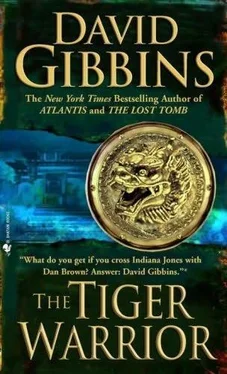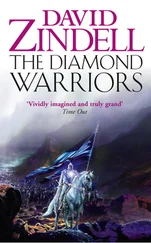David Gibbins - The Tiger warrior
Здесь есть возможность читать онлайн «David Gibbins - The Tiger warrior» весь текст электронной книги совершенно бесплатно (целиком полную версию без сокращений). В некоторых случаях можно слушать аудио, скачать через торрент в формате fb2 и присутствует краткое содержание. Жанр: Прочие приключения, на английском языке. Описание произведения, (предисловие) а так же отзывы посетителей доступны на портале библиотеки ЛибКат.
- Название:The Tiger warrior
- Автор:
- Жанр:
- Год:неизвестен
- ISBN:нет данных
- Рейтинг книги:4 / 5. Голосов: 1
-
Избранное:Добавить в избранное
- Отзывы:
-
Ваша оценка:
- 80
- 1
- 2
- 3
- 4
- 5
The Tiger warrior: краткое содержание, описание и аннотация
Предлагаем к чтению аннотацию, описание, краткое содержание или предисловие (зависит от того, что написал сам автор книги «The Tiger warrior»). Если вы не нашли необходимую информацию о книге — напишите в комментариях, мы постараемся отыскать её.
The Tiger warrior — читать онлайн бесплатно полную книгу (весь текст) целиком
Ниже представлен текст книги, разбитый по страницам. Система сохранения места последней прочитанной страницы, позволяет с удобством читать онлайн бесплатно книгу «The Tiger warrior», без необходимости каждый раз заново искать на чём Вы остановились. Поставьте закладку, и сможете в любой момент перейти на страницу, на которой закончили чтение.
Интервал:
Закладка:
“I never understood why you left America, Robert.”
“My family is Irish, remember.” Wauchope slouched down beside the railing, and fished out a pipe. “Not poor Irish, but landowning Irish of English origin. My father moved us to America because he felt powerless during the famine, and could not bear to return afterward. We have a long tradition of soldiering. For me, it was either West Point or the Royal Military Academy. After having lived through the American Civil War as a boy, I never wanted the possibility of facing my brother on the field of battle.” He tapped his pipe. “I was inclined to seek my glory abroad.”
“I was here in India during the mutiny, you know,” Howard said. “A babe in arms. I don’t remember it and my mother never told me what I saw, but I used to have bad dreams. Not anymore.” He paused, then he gestured at the book. “What are you reading?”
Wauchope deftly struck a match with his other hand and lit his pipe, sucking on it as he flicked the match overboard. He raised the spine of the book toward Howard. “Arrian. The life of Alexander the Great. We found some ancient ruins up beyond the Indus, and I’m sure they’re Greek altars.”
“The frontier’s got you hooked, Robert.”
“I’ve put in for the Survey of India, you know. They’ve got a vacancy on the Boundary Commission. I was heading back from the Afghan campaign to tie up my affairs with the regiment in Bangalore when I was diverted here as a replacement.”
“We’ve been dropping like ninepins. Every officer who steps into the jungle is prostrate within a week. It’s the worst fever I’ve ever seen.”
“You seem to have survived it.”
“I was born here, remember? Any child who survives the Bengal summer is set for life.”
“Surgeon-Major Ross in Bangalore thinks it’s the mosquitoes.”
“Of course it is.” Howard swatted his neck, and peered up at the sky. Beyond the hills a black swathe of cloud had appeared, forked by distant lightning. “And we’re not safe from mosquitoes anymore on the river. The monsoon’s pushing them out over us like a pestilential blanket.”
“Pity.” Wauchope drew on his pipe, closing his book. “If you only allowed yourself to be struck down by the fever, you’d be invalided from here and then sent to Afghanistan. That’s where careers are being made. There’ll be no medals out of this place.”
“I’m detailed for the Khyber Field Force. They say the war there isn’t over yet. But I’ve wanted to be near Edward and Helen in Bangalore. Colonel Prendergast has been most understanding.”
“Ah.” Wauchope put his hand on Howard’s arm. “How is your little boy?”
Howard’s face fell. “He’s not good, Robert. He’s been sickly all year. You know what that can mean for an infant out here.”
Howard’s voice hoarsened. “I cherish him dearly. Poor Helen is beside herself.” He turned away, blinking hard, then knelt up again and peered over the plating. He passed his telescope to the other man. “See what you make of that.”
Wauchope glanced at Howard with concern, then peered through the glass at the foreshore. “Good Lord. There must be five hundred of them, maybe more.”
The scene had changed from a few moments earlier. There were now crowds of men milling around the bonfires, and there were gourds, the palm liquor flowing freely. The men with braided hair wielded swirling batons, now weaving them into spirals, now figures of eight and back again. Drums were being beaten, discordant, out of unison, then together in a monotonous beat. Suddenly an extraordinary apparition materialized out of the smoke. A dozen men appeared with extravagant headgear of bison horns, great curved horns that perched precariously on their heads. They wore tiger skins, and their faces were red with kumkum powder. As they came forward the air was rent with shrieking, so loud it set Howard’s teeth on edge. The men advanced in a line toward the riverbank, retreated, then advanced again, kneeling down and pawing the earth in imitation of fighting bulls.
“I believe they are invoking the bloodred god of battle, Manecksoroo,” Howard murmured. “Asking to turn battle axes into swords, bows and arrows into gunpowder and bullets.”
“They have real bulls too,” Wauchope said, passing the telescope over. Howard peered through, and grunted. “So that’s it.” He snapped shut the glass, then turned and leaned back against the railing. “Bull sacrifice. That’s what those pits are for. They mix the blood with grain and throw it into the forest clearings, to induce fertility of the soil. This could go on for hours, until they are stupefied with the toddy.”
“I thought sacrifice had been suppressed,” Wauchope said.
“Human sacrifice, yes, decades ago, but not animal sacrifice, though it’s discouraged.” Howard slumped, suddenly overwhelmed with lassitude. “This is what those idiots at the Board of Revenue don’t understand. I’ve brought Campbell’s book on the suppression of human sacrifice with me. You can read it yourself He says we can’t use morality to persuade a people to give up their age-old customs. Our morality means nothing to them. You have to show them that their life will be improved as a consequence. If you then take away their greatest pleasures, they will return to their old ways. We broke the cycle by showing them their land could be fertile without needing sacrifice. Now a stroke of the pen in Calcutta and it is all undone. It was all lurking just below the surface, just inside the jungle, but now they want us to see it. You can hardly blame them.”
“Tell me about these people.”
“They’re Koya,” Howard said. “Descendants of the ancient Dravidian inhabitants of India, here at the time of Alexander the Great. But you couldn’t get a greater contrast to the civilization of the Mughals or the Sikhs. These people are more akin to your Red Indians. They hunt in the jungle and burn small clearings for crops. Hardly any of them have a notion of the world outside.”
“Maybe no bad thing,” Wauchope murmured, drawing on his pipe. “Do we have their language?”
“I possess a slight colloquial knowledge of the vocabulary. But we have our interpreter, who tells me about their customs.” Howard jerked his head toward a small, wiry man of indeterminate age sitting cross-legged on the foredeck, his skin deeply tanned and wearing only a white loincloth. His hair was dark brown, almost auburn, curly like his straggle of beard, and his face was wizened. In one hand he was holding a bow and arrows, and in the other a tubular section of bamboo about a foot long. His only embellishment was a gold chain hanging from the top of one ear to the lobe, with a small pendant dangling below. He was smoking a cheroot, and his eyes seemed dazed.
“He’s half-cut on palm wine,” Howard said. “It can’t be helped. It’s their lifeline during the monsoon. That’s what this rebellion is all about. How much did Colonel Rammell tell you?”
Wauchope shook his head. “I only had time to report my arrival at the field force headquarters in Dowlaishweram. The boat with the sapper reinforcements was already waiting to take me upriver. And Rammell and his adjutant were both prostrate with fever. Like almost all the other officers.”
Howard exhaled forcibly. “Well here’s the nub of it. If some imbecile on the Board of Revenue hadn’t decided to impose a tax on palm toddy, then we wouldn’t be here. That, and the native policemen. For months at a time the only outside presence among these people has been the constables, lowlanders the hill people despise. The British superintendent of police and the agency commissioner hardly ever come up here because of the jungle fever. The constables are free to intimidate and exploit the hill people as lowlanders always have done. And now that we need them, they’re worse than useless. Hardly a man of them can be got to smell gunpowder. The rebels’ first act was to capture half a dozen of them. It’s good riddance as far as I’m concerned.”
Читать дальшеИнтервал:
Закладка:
Похожие книги на «The Tiger warrior»
Представляем Вашему вниманию похожие книги на «The Tiger warrior» списком для выбора. Мы отобрали схожую по названию и смыслу литературу в надежде предоставить читателям больше вариантов отыскать новые, интересные, ещё непрочитанные произведения.
Обсуждение, отзывы о книге «The Tiger warrior» и просто собственные мнения читателей. Оставьте ваши комментарии, напишите, что Вы думаете о произведении, его смысле или главных героях. Укажите что конкретно понравилось, а что нет, и почему Вы так считаете.












